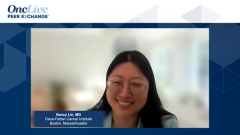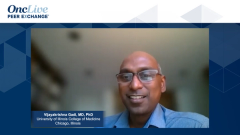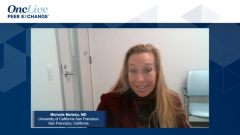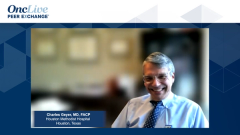
Patient Case: Frontline Treatment Options for HER2+ mBC
Taking into account a patient case of HER2+ metastatic breast cancer, experts review current frontline treatment options.
Episodes in this series

Vijayakrishna Gadi, MD, PhD: We have a little more information on this patient. We find out from the breast biopsy that she’s got 1 of these HER2 [human epidermal growth factor receptor 2]–enriched phenotypes. She’s hormone receptor–negative for estrogen and progesterone, but HER2-positive 3+ by immunohistochemistry. On top of that, the nodule is also similar in HER2+, presumably by FISH [fluorescence in situ hybridization], in this case as well. With that information, any changes in your thinking? I imagine not, correct?
Vijayakrishna Gadi, MD, PhD: With that in mind, we have a first-line patient, a virgin tumor that hasn’t seen a lot of therapy. Chuck, because you were just sharing some information with us, what’s your approach? Has this changed in recent years with all the new data?
Charles Geyer, MD, FACP: With first-line untreated metastatic cancer, these patients need dual HER2-targeted therapy with a trastuzumab-pertuzumab with chemotherapy. We’re tracking this. We’re trying to do a first-line metastatic trial looking at atezolizumab, NRG-BR004. What we’re seeing is that 80% of patients are presenting with de novo disease. Some have very advanced disease. It’s a surprise because the liver disease is dominant. Others are presenting, like this patient, with mammographic abnormality and some axillary nodes. When we get to staging—they’ve got relatively small volume—I don’t know if we can call it oligometastatic. But this is an area where there are some interesting questions out there, because broadly speaking there’s the idea that metastatic disease isn’t curative and that we should approach this in a palliative manner.
In the HER2+ space, I question that rigid thinking. But you do see it, and it’s 1 of these things that seems to be guideline driven. People say, “The guidelines say this is the regimen, so I’m going to use it.” I tend to be a bit more aggressive with my chemotherapy when I have a patient with newly diagnosed cancer in the breast with small-volume oligometastatic disease. I tend to use neoadjuvant regimens with HP [trastuzumab, pertuzumab] and try to make it all go away. If I have a pathologic complete response in the breast and the nodes, and the disease in the lungs disappears, that’s a good place to get a patient. Is there evidence based for this? This is always the challenge we have.
There’s a limit to what you can generate in prospective randomized studies, and this is the increasing challenge as we move forward with more agents. There’s a point where you can’t generate level 1 evidence for every question we’re seeing in clinic. This is 1 area. It’s clear that they need HP [trastuzumab, pertuzumab]. They need chemotherapy. But there are oligometastatic questions about this.
Vijayakrishna Gadi, MD, PhD: I’m glad you brought up the atezolizumab trial. I put a gentleman on that study this week.
Charles Geyer, MD, FACP: Thank you.
Nancy Lin, MD: It raises a great point: we have fewer patients with recurrent HER2+ metastatic breast cancer. The patients we see more and more have de novo disease, and that’s a really important point. There are first-line trials out there that don’t wait to refer patients for clinical trials until their nth line. There’s the NRG-BR004 study with atezolizumab. There’s the DESTINY-Breast09 study randomizing THP [docetaxel, trastuzumab, pertuzumab] vs Enhertu or trastuzumab deruxtecan. There are good first-line trials out there. Between the NRG-BR004 trial and DESTINY-Breast09, there’s fairly good coverage across the United States. I’ll put in a plug that there are definitely trials in the early line setting.
To Chuck’s point, there’s a lot of interest in trying to determine whether there’s a subset of patients with HER2+ metastatic breast cancer who can be cured. Some have already been cured, and we just aren’t brave enough to stop their trastuzumab. That’s going to be the subject of a trial through the Translational Breast Cancer Research Consortium looking at exceptional responders that will be led by my colleague Heather Parsons. There’s also the question of whether we should purposely escalate people’s therapies à la an adjuvant regimen using non-cross-resistant treatments, switched not because of progression but because it’s a fixed regimen. I’m not doing something so escalated outside a trial with the exceptions of what Chuck has mentioned, which is those oligometastatic patients. But it’s an interesting question, and hopefully that will become a study that opens in 2022, because this may be the first group of patients that we can attempt to cure with metastatic disease.
Charles Geyer, MD, FACP: If you look at CLEOPATRA, you’ve got the tail on the curve. We do see subsets of patients who are free from progression 8 years out, but that subset grew with the addition of pertuzumab. The HER2+ space, particularly when you’re starting with relatively small-volume disease, is a little different. It’s more about the volume. You’ll see patients who didn’t realize they had it—they’re a little nauseated, and they come up with loaded liver metastases. That’s a different patient from what we’ve got. I guess this is what we’re losing a little. The guidelines get set up based on clinical trial cohorts that you need to define to try to get your study done. But not everybody is fitting those cohorts that well. There are some things that we need to—particularly as we’re getting all these amazing therapeutics in this space. NRG-BR004 is struggling with approval in part because we don’t see as many of these patients as we used to.
Transcript edited for clarity.








































